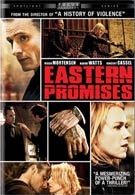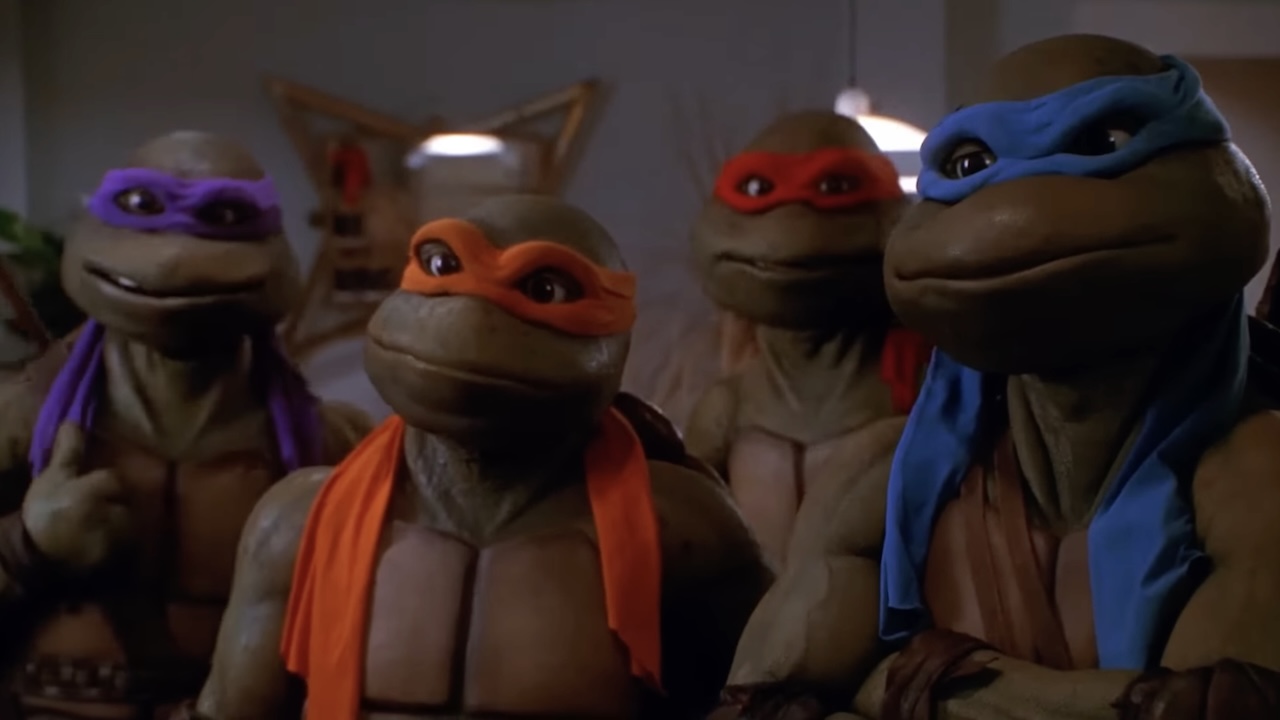David Cronenberg follows up his critically praised A History of Violence with another movie starring Viggo Mortensen. Eastern Promises shares an affinity for shocking graphic violence with its predecessor, but, try as it might, isn’t quite able to mine the same psychological depth. Watching Eastern Promises is often a frustrating experience. The performances by all of the leads, Viggo Mortensen, Naomi Watts, Vincent Cassell, and Armin Mueller-Stahl, are great and the plot is engrossing. At times, though, it feels like director David Cronenberg is trying to add some additional, deeper, meaning to the story that just doesn’t want to stick. The movie ended with me wondering, “what did I just miss?”
Cronenberg opens up the world of the Russian Mafia in London by focusing on Nikolai (Mortensen), a driver and doer of dirty jobs for Kirill (Cassel), son and heir apparent to a vicious Russian gang. Kirill’s father, Semyon (Mueller-Stahl) is outwardly a charming and urbane restaurateur, but controls his drug and sex slavery trades with ferocious cunning. Semyon is protective of his less-than-efficient son, but recognizes promise in Nikolai.
A pregnant Russian teenager dies giving birth and British midwife Anna (Watts) uses her diary to see if there is any clue to the girl’s family. Living with her mother (Sinead Cusak) and Russian uncle Stepan (Jerzy Skolimowski), Anna doesn’t want the baby abandoned to foster care, still coping with the loss of her own unborn child. Anna takes the diary to Semyon’s restaurant to see if anyone there will translate it (her uncle, sensing the risk, refuses) and meets Nikolai, who warns her away, telling her to stay with “nice people.”
Cronenberg, working from a script by Steven Knight (Dirty Pretty Things), takes his time setting all the pieces into place and what follows turns out to be a little less than you might expect. The second half is an interesting, and slickly shot, crime thriller with Semyon trying to get his hands on the diary while Nikolai manipulates Kirill, thus moving ever closer to the seat of power. It certainly holds attention and some of the scenes, including a brutal attempted murder in a steam bath with Mortensen on…ummm….full display, are tense and well structured. Unfortunately, it never really rises above the level of professionally made gangster picture.
Mortensen is being praised for his performance and it’s a good one but to what end? The plot even has a twist that you probably won’t see coming but it doesn’t make you look at anything or anyone that differently. No real new light is shed on the genre and there aren’t enough explored psychological undertones to make it more than the sum of its parts. This movie feels too much like a missed opportunity, but a fairly entertaining one. Not unlike the movie itself, the disc is not everything it could be. Although the sound and visuals are top-notch, there is a paucity of extras. Only two featurettes totaling about 16 minutes are included. There is no commentary or deleted scenes.
The lack of a commentary is a little odd, since Cronenberg does not seem to be dead set against commentaries like some other directors. He did a commentary for the deleted scene in A History of Violence. Cronenberg also takes part in the featurettes and explains the themes of the movie, so why not record a commentary? In any event, it’s not there and after hearing a few comments by writer Steven Knight in the featurettes, it wouldn’t be hard to think he could have put together a great fact based commentary on the world of Russian mobsters in London.
The disc does contain a fairly decent 10 minute featurette called “Secrets and Stories.” Knight discusses how the movie grew out an assignment for a piece on the Russian Mafia for the BBC. Cronenberg, Mortensen, Watts, Mueller-Stahl, and Cassel talk about the film and the filming. Cronenberg even discusses the use of accents by the different cast members.
Your Daily Blend of Entertainment News
More specific, but also much more interesting, is the six minute extra on the body tattoos seen on the Russian mobsters, called “Marked for Life.” The comments are split between the real life purpose for the tattoos in the mob world and how they came up with the tattoos that Mortensen and others had on their own body. More on this subject both in the movie and the extra would have been very welcome.
That is it for the extras, which I find a little disappointing. It’s not clear if there was a financial reason for the lack of effort with the DVD or some sort of philosophical desire not to comment on the movie too much. Either way, it makes for a less interesting DVD experience, despite the positive aspects of both the movie and the disc.

